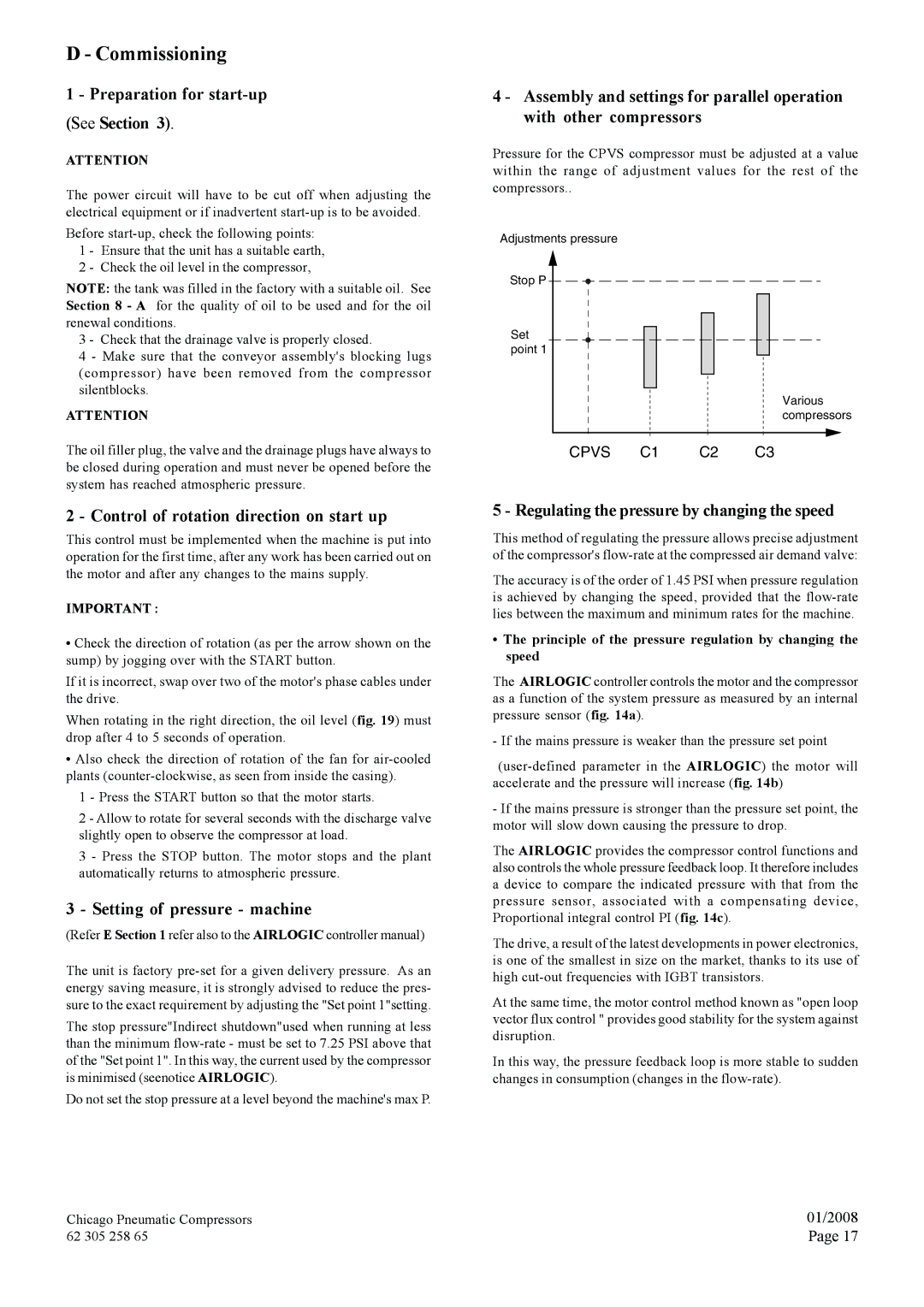
D - Commissioning
1 - Preparation for start-up (See Section 3).
ATTENTION
The power circuit will have to be cut off when adjusting the electrical equipment or if inadvertent
Before
NOTE: the tank was filled in the factory with a suitable oil. See Section 8 - A for the quality of oil to be used and for the oil renewal conditions.
3 - Check that the drainage valve is properly closed.
4 - Make sure that the conveyor assembly's blocking lugs (compressor) have been removed from the compressor silentblocks.
ATTENTION
The oil filler plug, the valve and the drainage plugs have always to be closed during operation and must never be opened before the system has reached atmospheric pressure.
2 - Control of rotation direction on start up
This control must be implemented when the machine is put into operation for the first time, after any work has been carried out on the motor and after any changes to the mains supply.
IMPORTANT :
•Check the direction of rotation (as per the arrow shown on the sump) by jogging over with the START button.
If it is incorrect, swap over two of the motor's phase cables under the drive.
When rotating in the right direction, the oil level (fig. 19) must drop after 4 to 5 seconds of operation.
•Also check the direction of rotation of the fan for
1 - Press the START button so that the motor starts.
2 - Allow to rotate for several seconds with the discharge valve slightly open to observe the compressor at load.
3 - Press the STOP button. The motor stops and the plant automatically returns to atmospheric pressure.
3 - Setting of pressure - machine
(Refer E Section 1 refer also to the AIRLOGIC controller manual)
The unit is factory
The stop pressure"Indirect shutdown"used when running at less than the minimum
Do not set the stop pressure at a level beyond the machine's max P.
4 - Assembly and settings for parallel operation with other compressors
Pressure for the CPVS compressor must be adjusted at a value within the range of adjustment values for the rest of the compressors..
Adjustments pressure
Stop P
Set point 1
Various compressors
CPVS C1 C2 C3
5 - Regulating the pressure by changing the speed
This method of regulating the pressure allows precise adjustment of the compressor's
The accuracy is of the order of 1.45 PSI when pressure regulation is achieved by changing the speed, provided that the
•The principle of the pressure regulation by changing the speed
The AIRLOGIC controller controls the motor and the compressor as a function of the system pressure as measured by an internal pressure sensor (fig. 14a).
- If the mains pressure is weaker than the pressure set point
-If the mains pressure is stronger than the pressure set point, the motor will slow down causing the pressure to drop.
The AIRLOGIC provides the compressor control functions and also controls the whole pressure feedback loop. It therefore includes a device to compare the indicated pressure with that from the pressure sensor, associated with a compensating device, Proportional integral control PI (fig. 14c).
The drive, a result of the latest developments in power electronics, is one of the smallest in size on the market, thanks to its use of high
At the same time, the motor control method known as "open loop vector flux control " provides good stability for the system against disruption.
In this way, the pressure feedback loop is more stable to sudden changes in consumption (changes in the
Chicago Pneumatic Compressors | 01/2008 |
62 305 258 65 | Page 17 |
